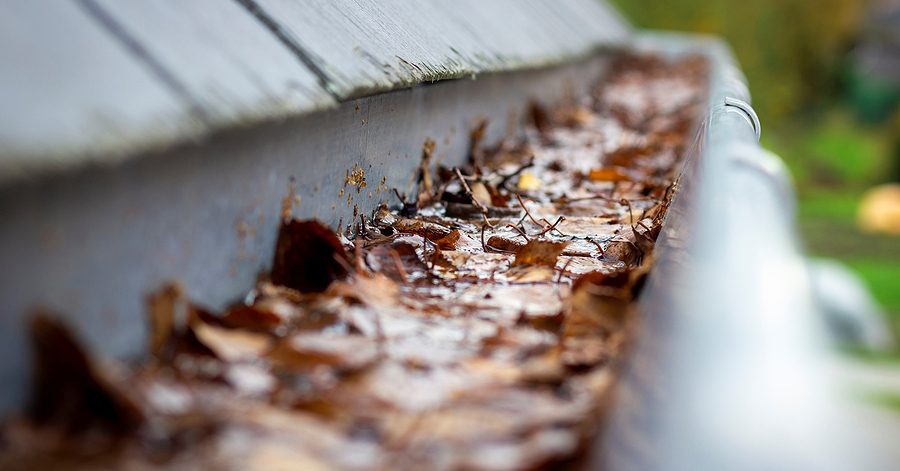The Dangers of Gutter Sludge and How to Prevent It

What Is Gutter Sludge?
Gutter sludge is an accumulation of debris in your gutter system that consists of very fine organic material and is typically black and slimy. Because the material can be very fine, it is hard to remove it by relying on rainwater flow alone. Gutter sludge can form as a mass over time that creates gutter clogs as twigs and leaves join the mix, making gutter cleaning a greater challenge.
What Does Gutter Sludge Consist of?
The fine particles that create gutter sludge include pollen, algae, moss, small bits of decomposing leaves and twigs, and even animal carcasses. This rotting material becomes a slimy mess that will clog your gutters and downspouts.
Aging roof material that breaks down over time can also run down into your gutters, adding to the sludge mixture.
Is Gutter Sludge Dangerous?
Clogs in your gutters and downspouts created by gutter sludge prevent them from successfully moving water through your gutter system. Water that can not drain properly will run over your gutters impacting your home’s foundation.
Some water may also back up onto your roof where it will pool and eventually cause damage. This roof damage can result in leaks which further damage the interior of your home.
How to Prevent Gutter Sludge
Routine gutter cleaning can prevent gutter sludge
If you are routinely cleaning your gutters, you should be able to successfully avoid the accumulation of gutter sludge. Regular gutter maintenance should be completed in the spring and autumn when the most pollen, leaves, and other tree debris is present.
When you are having your gutters cleaned, be sure to clean the bottom of your gutters until you see that there is no residue remaining. If all you do is remove leaves and twigs, you will likely leave behind gutter sludge or the beginnings of it.
Gutter guards can help prevent the accumulation of gutter sludge
One of the best ways to prevent gutter sludge is to install gutter covers. Gutter guards are covers over your gutter that prevent leaves and most debris from accumulating in them. Gutter guards still allow water to flow into the gutter and then through the downspout.
Gutter protection can be very affordable and cost-effective in the long run. Gutter guards can help reduce the amount of deep cleaning your gutters will need and even protect your gutters over time, helping them last longer.
Gutter filters are not as effective
Gutter filters are simple mesh inserts that can help prevent gutter sludge accumulation. However, suppose you have a lot of debris and fine materials accumulating. In that case, the gutter filter may not be strong enough to withstand the amount of debris on top of it or prevent gutter sludge from eventually forming.
How to Remove Gutter Sludge
Since gutter sledge is challenging to remove, we recommend the services of pros who know how to complete this job safely and effectively.
If, however, you want to clean your gutters yourself, there are a few tools you should have on hand to make the job easier. A gutter scoop, a gutter cleaner sprayer that includes brush-like attachments, and a blower that can quickly remove dried material are used by professionals. Of course, you will need a ladder and a bucket, yard bags, or another collection device for the removed debris and sludge. Oh - and wear gloves!
Blow out your gutters
Use a yard blower (there are attachments for many blowers that are useful for gutter cleaning,) to blow out as much debris as you can from your gutters and the lower area of your roof. If you can, consider blowing all of the leaves and twigs off your roof entirely.
Scoop out your gutters
Next, use your gutter scoop which will act as a shovel and is designed to remove a lot of debris and sludge with each scoop. Depending on what you find in your gutters, the material may be great compost for your garden!
Spray out your gutters
If blowing and scooping do not complete the job, you likely have gutter sludge to contend with as well. If so, use a sprayer designed for gutter cleaning to remove any final particles or residue. Be sure to spray inside your downspouts, as much as you can reach, to eliminate any potential clogs.
If needed, you may also want to consider a periodic roof washing to remove any caked-on debris or algae slime.
Have Gutter Sludge? Contact Ned Stevens
If you have clogged gutters and don't want to clean them yourself, Ned Stevens Gutter Cleaning of Long Island is happy to help you - even with that nasty sludge! We’ve been serving homeowners in Nassau County and Suffolk County since 1965 and offer on-demand as well as cost-saving contract options for seasonal gutter cleaning.
Using our services, you will never have to worry about scheduling your gutter cleaning again!
Contact us today for your gutter cleaning, gutter repair, gutter replacement, and gutter guard needs.

